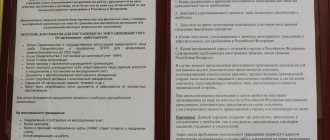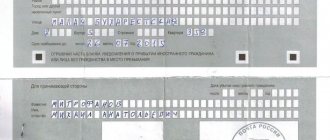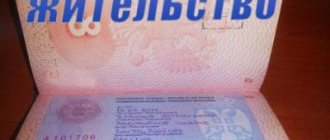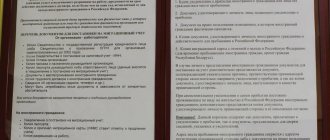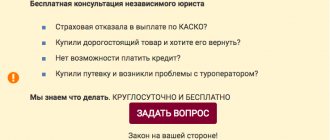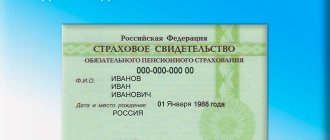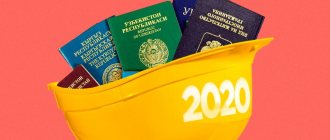If you are heading to the Russian Federation, then at the border you will be required to check your identity document.
By presenting their passport to the Russian Border Guard Service, some people suddenly find out that they are not allowed to enter the country. You have to go back, and this means lost time and money, as well as unrealized plans.
Such situations can be avoided if you first check whether your name is on the blacklist of the Russian Ministry of Internal Affairs.
Any foreigner has this opportunity. After completing the procedure, you can be sure that the road to Russia is open, that you can stay in the country legally, travel, visit friends and family, study, do business or work.
It makes sense to check their foreign workers and employers, since hiring people who are prohibited from being on the territory of the Russian Federation is fraught with serious sanctions.
Where to check your passport?
If you need to check your passport for restrictions on entry into the territory of the Russian Federation, it can be done on the official resource of the Main Directorate for Migration Issues of the Ministry of Internal Affairs of the Russian Federation (GUVM MIA of the Russian Federation). All foreign citizens have access to verification.
It is important to know that the online service for checking the presence of restrictions on entry into the territory of the Russian Federation is for reference only, so even if you correctly entered the requested data into the form and received a negative response to the request, this does not mean that you are not on the blacklist.
The platform provides information about the presence of a ban on entry into the country only through the Ministry of Internal Affairs of the Russian Federation.
The most accurate data on the absence or presence of a ban on crossing the border of the Russian Federation can be obtained by personally contacting the Main Directorate for Migration of the Ministry of Internal Affairs of the Russian Federation. To do this, please submit your request electronically here.
Features of deportation from the Russian Federation
The final decision is made at the state level. Peculiarities:
- if the length of stay of a foreigner is shortened, he must leave the Russian Federation within three days;
- When canceling documents, the departure time is increased to 15 days;
- Before deportation, the citizen is placed in a special institution.
The procedure is carried out at the expense of the deportee. If he does not have finances - for the money of the inviting party or the consulate.
Why can they ban entry into the Russian Federation?
No one can prohibit a person from visiting a particular country without a reason. If you are detained at the entrance to the state, then there are violations of its legislation on your part.
In Art. 27 of Federal Law No. 114-FZ of August 15, 1996 “On the procedure for entry into and exit from the Russian Federation” provides a complete list of grounds under which foreign citizens and stateless persons (LSP) are not allowed to enter the country.
For example, such grounds include the commission of 2 or more administrative offenses during the year related to violation of public order and security, as well as the regime of stay in the country.
They apply even more strictly to those who pose a threat to the defense capability or security of the state, or to public order and the protection of public health, have an unexpunged or outstanding conviction for committing an intentional crime on the territory of the country or abroad, or used false documents.
The main problem is that the warning system does not work at all. If a decision has been made to ban a foreign citizen or LBG from entering the territory of the Russian Federation, then these persons can find out about him only at the border when passing border control.
Things are even more complicated with deadlines. Each ban on entry into the country has a certain time frame, but depending on the severity of the violation, they may not be allowed to enter the Russian Federation for a period of several months to 10 years or an indefinite ban may be established.
The online service of the Main Directorate for Migration of the Ministry of Internal Affairs of the Russian Federation does not provide information on the expiration dates of the ban on entry into the territory of the Russian Federation. Such information can be obtained by personally contacting the Main Directorate for Migration of the Ministry of Internal Affairs of the Russian Federation. It is possible to send an application electronically, in which case you will need to provide an identification document.
Decisions made by territorial divisions of the Main Directorate for Migration of the Ministry of Internal Affairs of the Russian Federation on the ban on a foreign citizen or LBG visiting the territory of the Russian Federation are not final. Such persons have the right to cancel them pre-trial or in court.
How restrictions are lifted
If you find out about the ban on leaving the country at the airport when the plane ticket has already been paid for, there is nothing you can do. The border guards will not let you cross the border, even if you have already paid all your debts, but for some reason the information from the bailiffs has not yet been received by the border service.
When debts have been paid, the bailiff must verify this. You can speed up this process with a personal appeal. Bailiffs review the case and transmit data to border guards. Sometimes it takes several days for the information to arrive, but generally you will have to wait about 14 days.
If a travel restriction was imposed on you by mistake, and you were unable to cross the border and at the same time lost money for tickets, you can go to court. With a high probability, you will be able to win the case, and you will be compensated for your losses. But it will no longer be possible to return lost time, benefits, or simply pleasant impressions from a joint family vacation. Therefore, even respectable citizens should periodically check the availability of enforcement proceedings in their name, so as not to spoil their vacation or business trip.
How to check your passport
To check passports for a ban on entry into the territory of the Russian Federation, you need to go to the official website of the Main Directorate for Migration of the Ministry of Internal Affairs.
- From the main page, go to “Useful services of the Ministry of Internal Affairs of Russia”, where in the column on the right, find “Services on migration issues”.
Location of the section “Useful services of the Ministry of Internal Affairs of Russia”
Location of the “Migration Services” section
- When you go to a new page, you will see many services for checking various data. You need to select the item “Checking the existence of grounds for banning the entry of citizens into the territory of the Russian Federation through the Ministry of Internal Affairs.” By clicking on the service, you will find yourself on its page with a form to fill out.
- To find out if you can enter Russia, fill out the fields in the form and click “Send request”.
You must enter the following personal data:
- Columns 1 and 2: last name and first name in Latin letters, exactly as in the passport.
- Columns 3, 4 and 5: last name, first name and patronymic in Cyrillic in Russian.
- Gender of the applicant (must be selected from the options provided).
- Date of birth (choose according to the suggested calendar).
- Citizenship (select from a list of states).
- Passport type.
- Passport ID.
- Document deadline.
- Which country or organization issued the passport?
After entering all the data, you need to enter the verification code in the last window, which is displayed at the bottom of the page, and click “Send request”. It is advisable to check the form carefully before submitting. Even if one letter or number does not match the actual data, your search will be in vain as you will receive incorrect information.
The verification service is free. By clicking on the submit request button, you automatically consent to the verification of your personal data.
Please note that the page has mandatory and optional fields to fill out. Those in which you must enter data are marked with a “*”.
Where to check the ban on leaving Russia
Some Russians are prohibited from leaving the Russian Federation. First of all, this applies to people who have debt to a financial institution. But at the end of 2014, the travel ban affected some officials, military and security forces.
Checking debts and fines on the FSSP website
You can check your passport regarding the impossibility of leaving at:
- Official website of the Main Directorate for Migration Affairs of the Ministry of Internal Affairs.
- The official website of the Federal Bailiff Service (relevant for debtors).
- The official website of the tax office.
- Unified portal of public services.
- Quickly online on the service nevylet.rf.
The FSSP website is convenient because there you can not only get all the necessary information, but also pay the debt.
After sending the request
The background check system operates quickly, so soon after submitting your request you will receive a notification that you are prohibited or allowed to visit Russia.
Most citizens receive the answer that there are no grounds preventing them from entering the country. Much less often, people are faced with the fact that they need to cancel their trip, since the system reported that for certain reasons it is impossible to visit the Russian Federation.
The question immediately arises: can the situation be corrected? Not always. It all depends on the reason why you have restrictions on entry into the Russian Federation.
Deportation and expulsion: what is the difference?
The main difference is that expulsion is an administrative punishment, and deportation is a measure of responsibility. The second is used in the absence of legal grounds for further stay in the country. Expulsion is also applied if there are reasons for staying, but if the migrant commits a crime. Its purpose is to ensure national security, maintain health, etc.
The decision on deportation is made by the migration authority, on expulsion - by the court. Deportation is carried out forcibly; expulsion is also possible independently.
What Rospotrebnadzor and other authorities monitor
With the onset of the global coronavirus epidemic, several new terms have entered the everyday vocabulary of Russian citizens, including the concepts of quarantine and self-isolation.
They are not identical to each other. Quarantine involves a regime of strict isolation of a citizen from the outside world. The person on it does not have contact with anyone except medical workers and a limited circle of people who are in isolation with him. This regime is established for persons who have a confirmed diagnosis of COVID-19 or are in contact with a patient. In addition, in accordance with the current rules, citizens who arrived in the Russian Federation from a trip abroad and have not received a negative coronavirus test are required to be in isolation. Its compliance is monitored by Rospotrebnadzor and other authorized bodies.
Unlike quarantine, self-isolation is a voluntary regime that healthy people have the right to adhere to. Self-isolation involves the maximum reduction of social contacts - the less a person communicates with other people, the lower the risk of infection and, accordingly, further transmission of coronavirus. Voluntary self-isolation is a measure by which every person has the opportunity to prevent the spread of the virus. The more people voluntarily reduce their contacts, the greater the chance that society as a whole will defeat the pandemic.
Self-isolation is voluntary; its compliance is not monitored by Rospotrebnadzor or other authorities.
Rospotrebnadzor and other authorized bodies monitor:
- compliance with quarantine by persons to whom it is officially prescribed;
- compliance with anti-epidemiological standards that have been introduced in a specific region of the Russian Federation. In particular, during different periods of the epidemic, various restrictive measures were established, for example, the opening hours of catering establishments were limited. At the end of February - beginning of March 2021, these measures began to be gradually lifted, but the situation with them is not the same in different regions of the Russian Federation.
How to find out about current coronavirus regulations
The virus situation is improving and some restrictions are being lifted. ConsultantPlus has collected all the current rules in one review: what is prohibited and what is allowed, whether it is mandatory to wear masks, what support measures are still in effect, and what monetary payments individuals and organizations can still receive. Convenient to keep track of changes. Free access for 2 days.
Cases when deportation can be avoided
There are certain categories of persons who cannot be deported. This applies to refugees and citizens who have asked the government authorities for political asylum. Even if the petition is considered, they cannot be expelled from the country. If the decision on granting status or asylum is negative, and there are no other legal grounds for stay, the foreigner will be deported.
Employees of diplomatic and consular departments are not subject to deportation. Deportation does not apply to persons who have lost refugee status, but have managed to prove that persecution awaits them in their home country. Regardless of the reasons, they have the right to ask for the expulsion to be lifted.
Compatriots need not be afraid - according to regulations, deportation applies only to foreign citizens. But the authorities sometimes make exceptions.
Financing the deportation procedure
The imposition of deportation implies that foreigners will bear the financial costs of leaving. If it is impossible to recover the amount from the violator, the invoice is presented to the country from which he arrived. Other sources of funding for the return trip:
- inviting party (individual or legal entity);
- diplomatic department of the country;
- budget of the Russian Federation.
An agreement on readmission was signed between Russia and Kyrgyzstan - residents of Kyrgyzstan will be deported at the expense of the Russian Federation.
Appealing deportation decisions
If a person is sure that he was expelled illegally, he has the right to appeal the decision in court and have his deportation lifted. The procedure is allotted 3 months from the date of familiarization with the decision. Pre-trial appeal is allowed by submitting an application to the head of the Ministry of Internal Affairs. If the claim is not satisfied, you must contact a higher authority within 10 days.
To do this, an administrative application is submitted to the court at the location of the FMS branch. Upon written request, deportation may be postponed during the trial. If the judge accepts the foreigner’s position, the deportation will be canceled.
Cancellation of deportation: when is it possible?
Forced deportation from a country is not always legal; deportation can be reversed. Reasons based on which you will be able to stay within Russia:
- residence in the territory of the Russian Federation of a close relative who has citizenship;
- availability of a document giving the right to employment;
- studying at a university in the country;
- availability of residence permit;
- undergoing treatment in a medical institution.
The presence of at least 1 reason does not guarantee automatic cancellation of deportation. The right to stay in the country must be documented. Only the court can revoke an expulsion.


